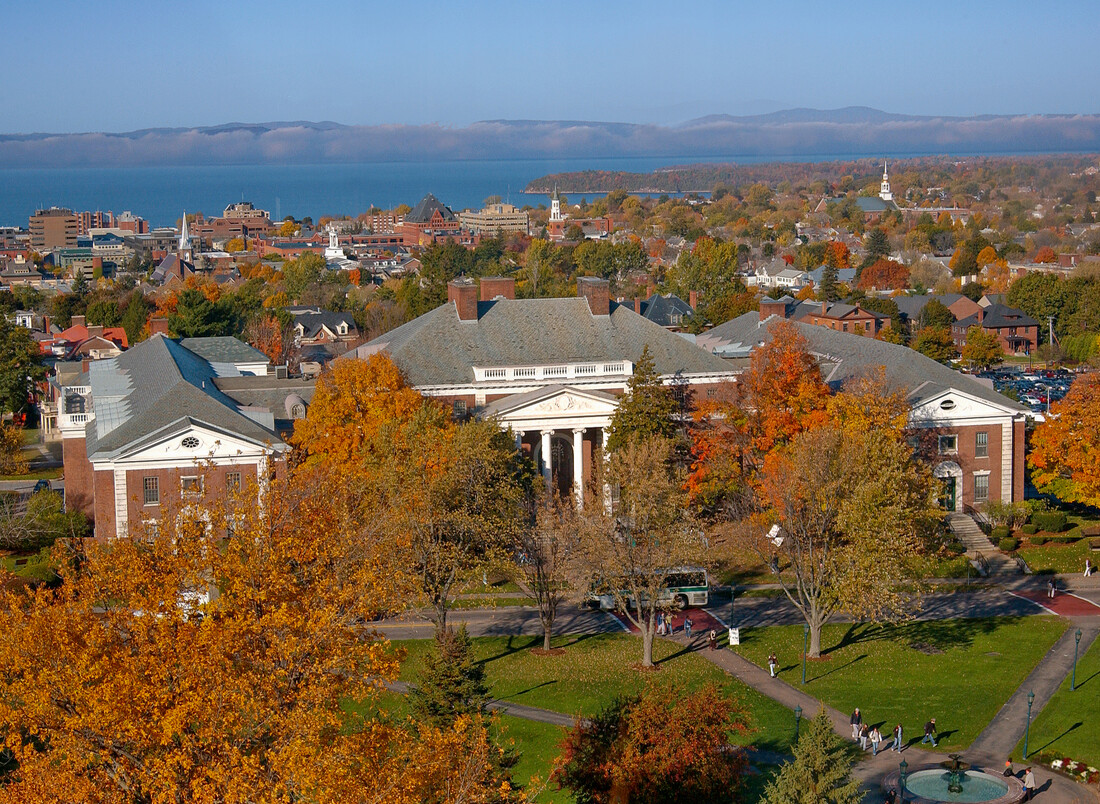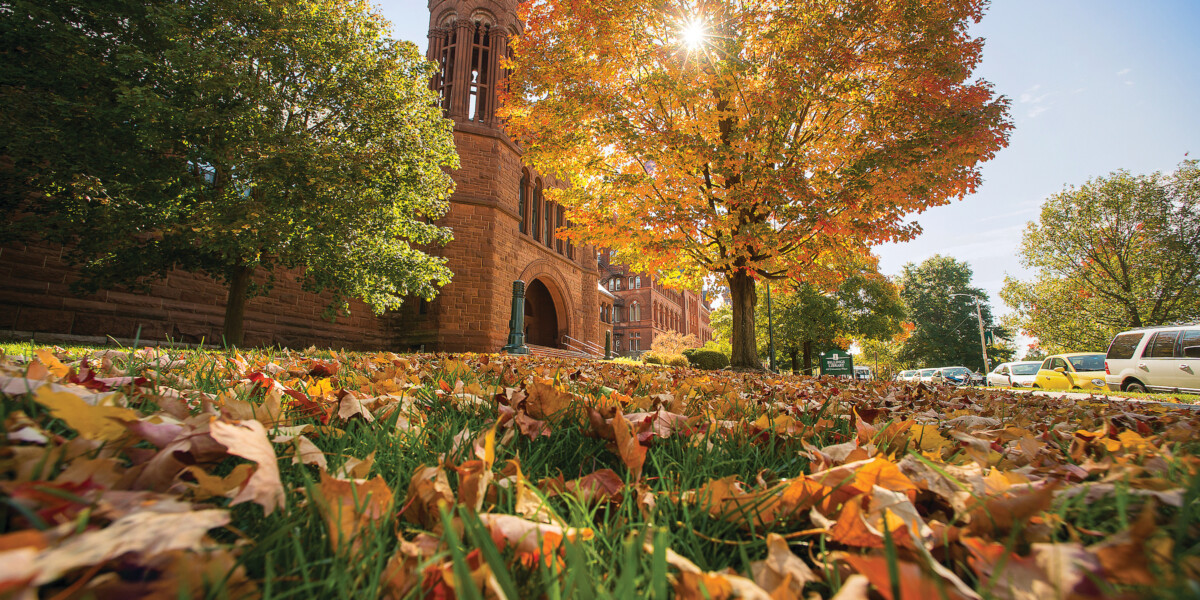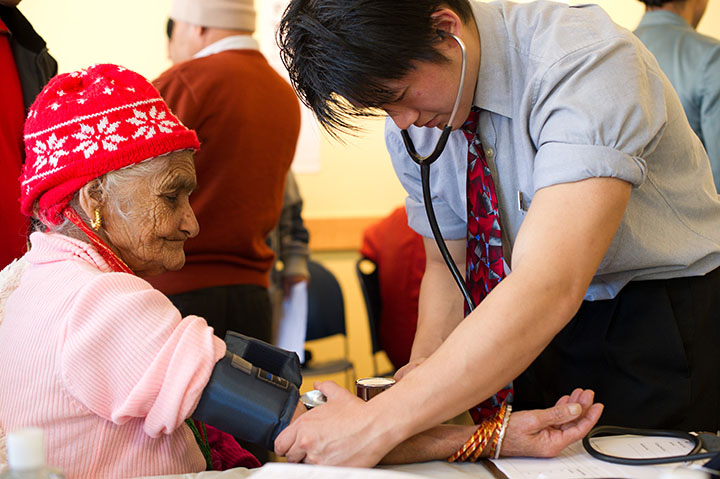Techie.com’s recent designation of Burlington, Vermont, as one of the country’s most promising tech hubs adds to a long list of national accolades for the city, creating a buzz that could attract even more businesses and investors, according to Vermont technology and economic development experts.
The attention also further highlights technology and economic development partnerships between the University of Vermont, the city and the state.
“UVM and the Office of the Vice President for Research have made it a priority to support and foster a variety of entities that play a key role in creating this tech hub atmosphere. When you couple those kind of entities with Dealer.com, MyWebGrocer, FreshTracks Capital and other innovative for-profit companies like those, you are creating the type of atmosphere and collaboration that will encourage and sustain a region as a hub,” said John Evans, Ph.D., interim vice president for research and president of the Vermont Technology Council. “We have made it clear that ‘UVM is open for business’ and we have no doubt that we will stay involved. It is clearly a priority of President Tom Sullivan and Provost David Rosowsky.”
Techie.com cited the congruence of “active, overlapping networks in Burlington both physically and in virtual space” that creates the “sort of energy and community engagement [that] is vital to innovation.” Burlington was the smallest of the 10 cities featured in the Jan. 6, 2014, list. Last October, two articles in The Atlantic cited the thriving culture of “Silicon Valley in Vermont” in Burlington, which produced Dealer.com, and extolled UVM’s “public ivy” status and embrace of the city’s “intensely outdoorsy, locavore culture.”
“As a community, we’re at a really positive tipping point for having a vibrant technology-based company ecosystem,” said David Bradbury, president of the Vermont Center for Emerging Technologies, the business and technology incubator that opened at UVM in 2005 and has assisted over 700 startups, with 37 VCET portfolio companies raising over $56 million in capital. “It’s about density. You get people, ideas, resources and capital together to see what happens, and that means you are more likely to produce a company that’s going to be a success. There are more people throwing spaghetti at the wall to see what sticks, and that’s great. Not every community has that.”
Lars Torres, director of the state’s Office of the Creative Economy, notes that this vibrant funding landscape and startup energy radiates from Burlington outward into Vermont – and includes opportunities not only in information technology but biosciences, health care and pharmaceuticals, renewable energy and food systems. “Students who are interested in entering that space,” Torres says, “should consider that UVM is not only providing them with an excellent education but an ecosystem nearby where you can jump in and enter that world.”
Burlington’s emergence as a tech hub is part of a trend in which “people are making more and more choices in terms of quality of life instead of how quickly they can climb the corporate ladder,” according to William Cats-Baril, Ph.D., director of UVM’s newly launched Sustainable Entrepreneurship MBA (SEMBA) program. “People are voting with their feet and moving away from environments that are unpleasantly stressful,” he says. They are finding ways to work remotely, and they are attracted to small cities like Burlington, which “has world-class health care, world-class education, a world-class landscape, and an increasingly lively and engaged entrepreneurial community.”
BTV Ignite, UVM and Next-Generation Internet Apps
Key to promoting and supporting this vibrant startup culture is BTV Ignite, an initiative to encourage public, private and academic institutions, including UVM, to use the city’s powerful gigabit infrastructure to develop the next generation of Internet applications. US Ignite, a non-profit, public-private organization with support from the White House Office of Science and Technology Policy, the National Science Foundation and the GENI Program Office, tapped Burlington as a partner community last fall.
“One of the challenges is that we have a lot of folks doing great technology work and they don’t always know each other or how to find each other,” said Nathan Wildfire, assistant director for economic development in Burlington’s Community and Economic Development Office. “Part of the BTV Ignite initiative is to find those folks and put them together.”
UVM has three representatives on the 20-member BTV Ignite advisory group: Dr. Evans; Dan Harvey, director of operations for Dr. Evans’ office; and Jane Knodell, Ph.D., professor of economics and a city councilor.
“UVM has helped drive our technology-based economy for many years, bringing innovation and resources to our growing tech sector,” Mayor Miro Weinberger said. “With my administration’s launch of BTV Ignite last October, UVM has further embraced its role in developing connections to other universities through high-speed Internet connections and links to national partners through US Ignite. UVM will be a key partner in realizing my goal of bringing gigabit access to every student in Burlington, making our city unique nationwide in combining high speed Internet with education.”
Dr. Evans’ office is the nexus for UVM’s involvement in BTV Ignite and other technology and economic development initiatives; most recently, his office was involved in Provost Rosowsky’s rollout to university trustees of plans for a $100 million STEM (science, technology, engineering, math) complex, to begin construction as early as 2018.
“UVM’s role in BTV Ignite is threefold: We will be hosting some of the core technology; we will be helping to increase connectivity through the Internet2 capability that we have in partnership with Vermont EPSCoR; and we will leverage UVM’s outstanding faculty in support of the application development. The term is ‘domain expertise,’ and UVM has it in great supply,” Dr. Evans said.
UVM’s Technology Initiatives
Among the multiple technology initiatives and programs supported by UVM, he cites:
- Vermont Center for Emerging Technologies and the Vermont Technology Council, both of which foster science- and technology-based economic development: Much of that activity has emerged from UVM research. The university, through its Office of Technology Commercialization, has seen a dramatic increase in its intellectual property and technology transfer activity. Of the 133 patents issued to UVM, 60 have been issued in the last five years. Seventy-three companies and institutions have licensed patents from UVM and are commercializing the technologies. From UVM, 16 startups have been formed, including 14 companies in Vermont.
- Technology infrastructure and high-speed networks: Through its involvement with the National Science Foundation-funded Vermont EPSCoR Internet2 Unified Community Anchor Network (UCAN) initiative, UVM is making high-speed Internet access and applications available to Vermont educational institutions – including the state colleges and Community College of Vermont, schools, libraries and museums – via the Burlington campus’ link to major hubs in Albany, N.Y., and Boston. In addition, UVM works closely with the city’s Burlington Telecom, which has one of the most advanced and robust fiber optic networks in the United States and has drawn accolades from US Ignite.
- Code for BTV and civic “hackathons”: Cited by techie.com for assembling local brainpower to solve community conundrums, Code for BTV has connected with UVM both informally – by drawing UVM students to its “civic hacking” events to build software/hardware prototypes – and formally through the university’s sponsorship of such events. On Feb. 15-16, 2014, UVM will co-host a food systems hackathon, bringing together software developers, designers, makers and others to the Northeast Organic Farming Association of Vermont’s conference in the Davis Student Center. “We will continue to sponsor these kind of events, whether it’s around health care, around smart grid, around food or other topics,” Dr. Evans said. “We have the space, we have the bandwidth. We can have 50 to 60 people arrive on campus and use their laptops. There are not a lot of places around Vermont where that can happen.”
- The UVM Business Engagement Portal is a gateway for individuals and companies to UVM research, education, technology, services and innovations.
- Maker movement: Generator, a maker space for Burlington, will open this spring in The Annex of the city’s Memorial Auditorium; UVM’s Harvey is a founding board member. “UVM is proud to sponsor the computational/app development area within Generator, and we plan to send as many UVM students through as we can,” Dr. Evans said. “We think that Generator and the maker movement are another manifestation of the energy and excitement that is putting Burlington and the region on the map as a tech hub.” The university also hosts the Vermont FabLab, featuring rapid-prototyping tools and workshops, in the College of Engineering and Mathematics’ Votey Hall. And UVM sponsored booths at the Champlain Mini Maker Faire at Shelburne Farms last fall.
- National middle and high school robotics events: The Feb. 23, 2013, FIRST Tech Challenge (FTC) drew 28 schools from across the country to UVM’s Davis Center for the annual competitive robotics matches. On March 14, 2014, UVM will hold the Vermont Regional Team FTC competition for 12 Vermont and 18 out-of-state teams.
Given this span of UVM and Burlington’s technology initiatives, Dr. Evans said, the inclusion of Burlington in techie.com’s article “was a pleasant affirmation but not a complete surprise.”




